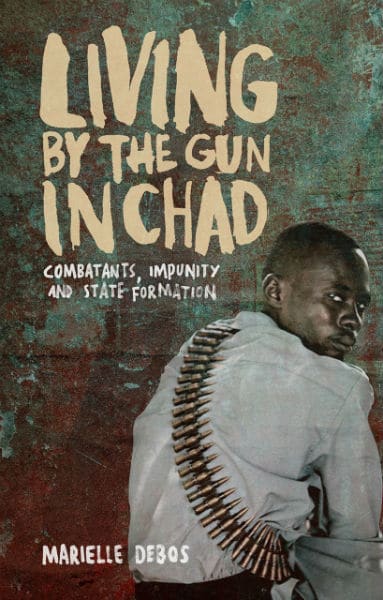Outside observers have often interpreted Chad’s long history with rebellion as reflective of internal chaos and questionable moralities. Marielle Debos nuances these superficial understandings with rich ethnographic and historical analysis in her newest volume, framing the threat and practice of armed violence in the Chadian context as a legitimate form of political struggle and an ordinary way of making a living, inscribed in both the mode of government and the political economy. By investigating the times and spaces outside of formal conflict – the “inter-war,” as she terms it – along with the unofficial and illegal practices of governance connected to the country’s history of war, Debos traces the relations of power in the political, economic, and social spheres to contribute to our understanding of the production of public authority within contexts of chronic violence. This work contains many valuable empirical and theoretical contributions to the field, not least of which is her argument that neither violence nor informalised governance mechanisms necessarily index a weak state: indeed, uncertainty, impunity, and organised disorder can serve as powerful tools for a “government by arms” (xii).
Overall, the book is ideal for Africanists and scholars of war and its aftermath. It will also appeal to anthropologists of policy and the state, conflict, and policy designers working in comparable contexts.
The book comprises three sections: the first establishes the socio-historical context within which war, violence, and men in arms have systematically shaped, and been shaped by, Chadian economic, social, and political life. Debos traces the long-term professionalization of combatants: through infusions of materials and weapons from external actors, the use of rebellion as a political tool, and the blurring of distinctions between formal and informal armed actors, among other dynamics. She identifies how armed violence in Chad reflects the historical norm, rather than exception, for a country “in the grip of a political field that has never excluded war” (43).
The second section examines the armed and political actors participating in war, inter-war, and peace processes, who (re-)produce the country’s political logics. Debos draws from three rebel and political leaders’ biographies in order to foreground how fluid alliances, loyalties, and social and kinship ties in the Chadian context reflect continuity, as opposed to the often presumed rupture, between relational practices in war, peace, and “ordinary” social life. Neither revolutions nor the actors producing them are stable, and these “unstable alliances need to be understood as the product of the way in which possibilities are managed by actors who interact in a difficult and ever-changing milieu. Those involved adapt, sometimes from day to day, to a set of constraints and resources that incite them to break and then renew their alliances on a regular basis” (91).
 This ever-changing milieu includes the political marketplace. Here, Debos puts her work in direct conversation with that of Alex de Waal by drawing on his conceptualisation of a political marketplace as a system of exchange-based governance: loyalties for favor. Implicated actors leverage peace processes, using war or its threat as a commonplace negotiating tactic embedded in complex patterns of post-war clientelism, in which demobilizing combatants compete for government posts and rents according to the negotiated stats of their former group. Drawing from interview and ethnographic data, Debos emphasizes the heterogeneity in the extent to which rebels and their leaders were able to, in fact, live by the gun, and the deep knowledge of social, capital, kinship, and political networks required in order to do so.
This ever-changing milieu includes the political marketplace. Here, Debos puts her work in direct conversation with that of Alex de Waal by drawing on his conceptualisation of a political marketplace as a system of exchange-based governance: loyalties for favor. Implicated actors leverage peace processes, using war or its threat as a commonplace negotiating tactic embedded in complex patterns of post-war clientelism, in which demobilizing combatants compete for government posts and rents according to the negotiated stats of their former group. Drawing from interview and ethnographic data, Debos emphasizes the heterogeneity in the extent to which rebels and their leaders were able to, in fact, live by the gun, and the deep knowledge of social, capital, kinship, and political networks required in order to do so.
The third section analyses the ambiguities and complexities of modes of government in Chad by following back channel approaches that are deployed consistently, even if not coherently, as an efficient mode of government. Setting aside shallow generalisations for the persistence of violence in Chad (e.g., “violent culture”, and “warrior values”), Debos instead digs deeper, turning to the case of the governance of the armed forces in order to demarcate the politics of ethnicity, armed action, and impunity.
She challenges the simplistic idea that regular and irregular forces occupy distinct domains operating under different rule sets; instead, each bears traces of the other, again – like the politicians and rebel leaders discussed previously – are in dialogue with rapidly changing sociopolitical landscapes.
The military’s “illegal practices and general blurring of status”, which have flourished under Chadian president Idriss Déby, “pervaded the whole social body…This mode of army management, which consisted in following other rules than those established by law and regulations, had many advantages” (137).
Among these “other rules” in Chadian society are those that govern the practices of impunity among a certain class of political actors. Impunity and social mobility, Debos argues, represent the primary means for the reproduction of the hierarchies produced by war and the governance of insecurity. “No legal or moral punishment is inflicted on those who circumvent the law,” she writes. “But you really need social capital if you are to rewrite it at will. Power relations mark the code of fraud…Each participant invents tactics to live and do business in this uncertain and risky world. But while such tactics belong to a repertoire of resistance, they do not allow people to overturn power relations” (152). In contrast to other works before this one, Debos argues that, in Chad, the state is neither weak nor absent. Rather, it has been informalised: a symbiosis exists between the official and the unofficial state – and its exercise reproduces a permanent inter-war in the country.
Though she does not compare or contrast this condition in other contexts – including those in the “first world” – the assertion is a useful one for the anthropology of statehood more generally, and certainly not limited to Chad.
Debos writes simply and directly, which lends to the clarity of her argumentation.
She leverages her ample historical and ethnographic data persuasively, and resists oversimplifying a seemingly chaotic context by showing how ethnographic methods contribute to locating the underlying logics at a variety of societal levels. This welcome approach has implications for questions well beyond those posed in conflict settings, such as those undertaken by anthropologists of development, policy, and interventions. Finally, her holistic assessment of the way in which the official and the legal co-constitute the unofficial and the illegal is a valuable and well-written contribution, even if not the first argument of its kind (cf., Tilly 1985, in which he posits state making as at least in part comprising practices akin to those of organized criminal enterprises, or Nordstrom 2004, in which she traces the informal networks, trade routes, and politics in order to throw into sharp relief the reach and limits of formal state channels). Living by the Gun provides excellent analysis and insights for political anthropologists working in a variety of domains.
References
Tilly, C. (1985). War making and state making as organized crime. In P. Evans, D. Rueschemeyer, & T. Skocpol (Eds.), Bringing the State Back In (pp. 169–187). Cambridge, MA & London, England: Cambridge University Press.
Nordstrom, C. (2004). Shadows of War: Violence, Power, and International Profiteering in the Twenty-First Century. Berkeley, California: University of California Press.
Debos, Marielle. 2016. Living by the Gun in Chad: Combatants, Impunity, and State Formation. Translated by Andrew Brown. 256 pp. Zed Books: London. ISBN: 9781783605323
Featured image (cropped): Darfurians refugees in Eastern Chad by EU Civil Protection and Humanitarian Aid Operations (flickr.com, CC BY-SA 2.0).



